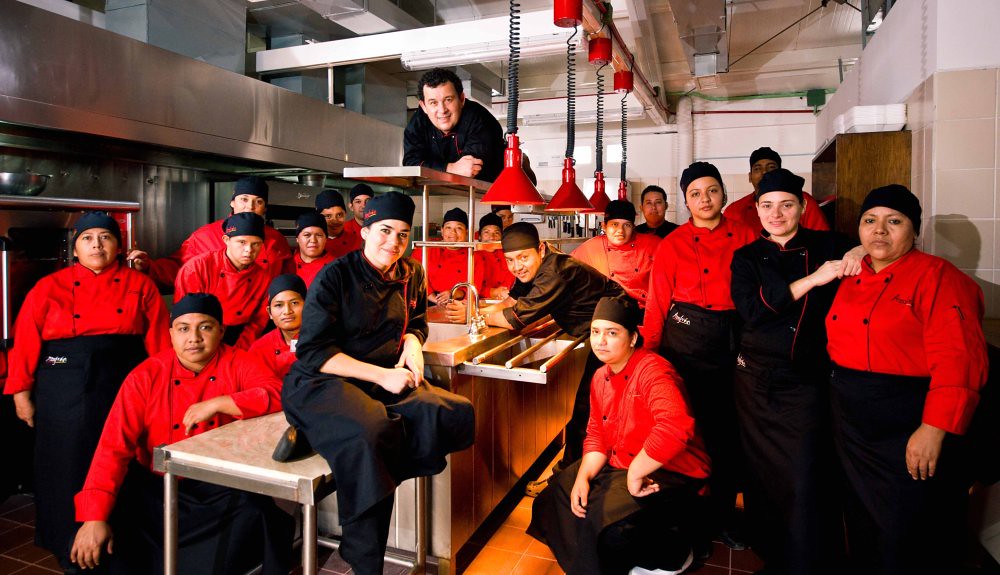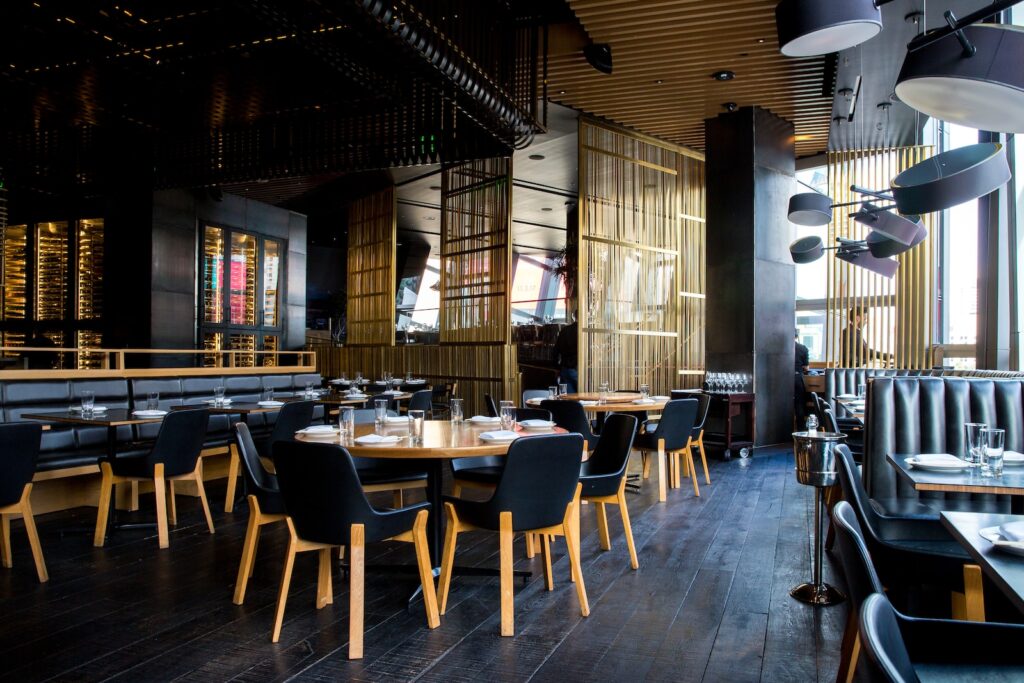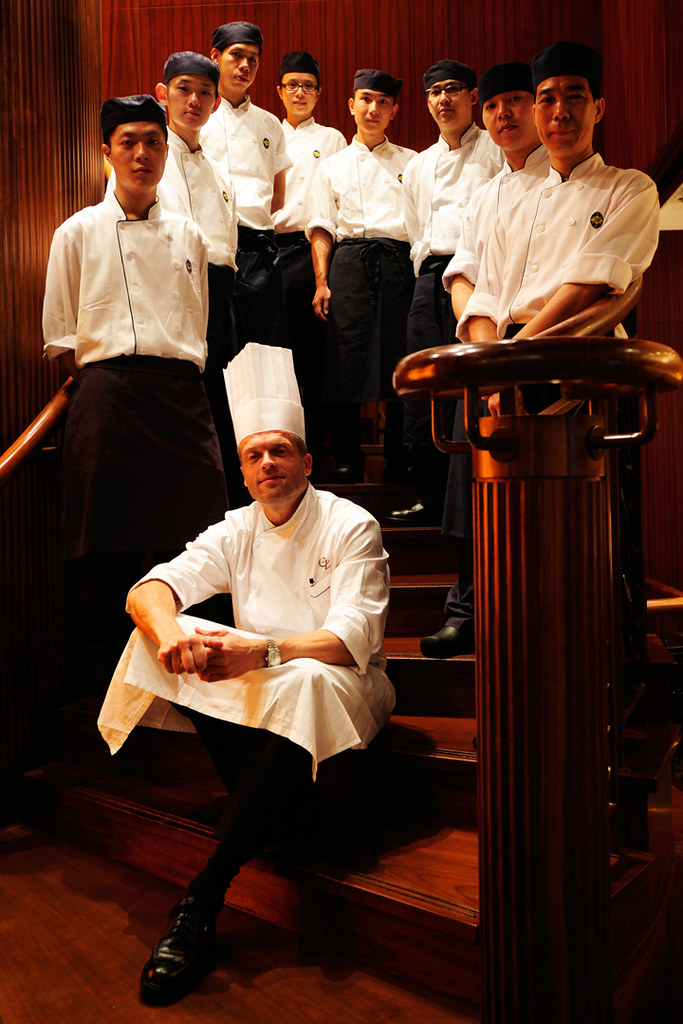Top 5 reasons to work in the hospitality
Top 5 reasons to work in the hospitality Are you looking for a career that combines personal fulfillment with professional growth? One that offers endless opportunities to thrive and work in virtually any corner of the globe? The hospitality industry is a dynamic and multifaceted field, spanning businesses such as hotels, restaurants, resorts, cruise ships, casinos, event planning, and beyond. At its core, it’s all about delivering outstanding customer service and crafting unforgettable experiences for guests. Curious about what makes hospitality a compelling career choice? Here are five key reasons why this industry stands out as both rewarding and fulfilling. Benefits of working in the hospitality industry You’ll grow – as a person and as a professional Read more A career in hospitality offers unmatched opportunities for personal and professional growth. It’s a fast-paced industry where professionals develop essential skills like customer service, communication, problem-solving, leadership, and teamwork—skills that are not only vital for success in hospitality but also transferable across industries. Whether starting in an entry-level role or joining with a hospitality degree, individuals can quickly climb the career ladder, progressing from roles like front desk agent to management positions such as general manager. It offers a dynamic and fast-paced working environment Read more From managing busy restaurants to overseeing hotel operations during peak events or organizing large conferences, every day brings variety and energy. A unique aspect of hospitality is its focus on creating memorable guest experiences. Professionals in this field are driven to exceed expectations, provide exceptional service, and handle guest inquiries or unexpected issues with efficiency and care. While demanding, this customer-centric approach is highly rewarding, allowing you to see the immediate impact of your efforts. The ever-changing nature of the job fosters rapid growth, helping you develop adaptability, decision-making, and problem-solving skills in a vibrant and engaging environment. Benefits of working in the hospitality industry Benefits of working in the hospitality industry You’ll have plenty of opportunities to demonstrate your creativity Read more The hospitality industry thrives on creativity, offering endless opportunities to craft unique guest experiences, design memorable events, and develop innovative menus or marketing campaigns. Professionals can tailor services to individual needs, stay ahead of evolving trends, and continuously innovate, making every day a chance to inspire and exceed guest expectations. You’ll enjoy first-hand interactions with diverse people and cultures Read more The hospitality industry fosters cultural diversity, offering opportunities to engage with people from various backgrounds, broaden horizons, and enhance intercultural fluency. These experiences enrich personal growth, build empathy, and develop inclusive, global perspectives valuable in any career. Benefits of working in the hospitality industry Benefits of working in the hospitality industry There’s so much potential for travel and adventure Read more If you love exploring new cultures, cuisines, and destinations, hospitality offers a unique chance to combine travel with your career. Roles in hotels, cruise lines, and resorts often include international opportunities, exposing you to diverse perspectives and fostering a global mindset. From glamorous locations to remote luxury lodges, hospitality delivers sens of adventure, cultural immersion, and personal growth. Wonder where the hospitality will take you? Letting us help you reach your career objectives is a smart way to fast-track your job search and find the role that’s right for you. With expert guidance, know-how in the hospitality job market and access to exclusive opportunities, and a tailored approach, we can help you take your career to the next level. Check out our hospitality roles Related topics Top 5 reasons to work in the hospitality How we can help you land your dream job in hospitality How to improve chef retention? Restaurant staffing – where to start?
How we can help you land your dream job in hospitality

How We Can Help You Land Your Dream Job in Hospitality The hospitality industry is fast-paced and dynamic, and finding the right job can be tricky. But with the help of Chefs & Curry, you can navigate this bustling sector more easily and land your dream role. Check out the key points below and start your journey with us. Expert Knowledge of the Hospitality Job Market Our recruiters have deep insight into the hospitality industry and know where the best job opportunities are. They understand the demand for specific roles, from kitchen assistants to all level chefs and hotel management, and can match you with positions that fit your skills and experience. Tailored Job Matches Our recruitment agency doesn’t just send you to any job—it focuses on finding the right fit. Whether you’re seeking work in a luxury hotel or a trendy restaurant/ bar, they’ll match you with employers that align with your career goals and values. Access to Hidden Opportunities Many top hospitality positions aren’t publicly advertised. We have exclusive access to these hidden opportunities, giving you a leg up on the competition and access to jobs that might not be listed elsewhere. Support and Guidance From refining your CV to preparing for interviews, our Chefs & Curry team offers valuable career coaching. We can help you stand out to employers and negotiate fair pay and benefits once you receive a job offer. Save Time and Reduce Stress Job searching is time-consuming, especially in a fast-paced industry. We can take the stress off your shoulders by streamlining the process, presenting you with roles that match your experience and career aspirations. Long-Term Career Support A good recruiter doesn’t just help you land one job—that’s why we like to build a lasting relationship. We’ll check in after your placement and keep you in mind for future opportunities, helping you progress in your hospitality career at a steady pace. Now it’s your time to make a move! Letting us help you reach your career objectives is a smart way to fast-track your job search and find the role that’s right for you. With expert guidance, know-how in the hospitality job market and access to exclusive opportunities, and a tailored approach, we can help you take your career to the next level. Check out our hospitality roles Related topics Top 5 reasons to work in the hospitality How we can help you land your dream job in hospitality How to improve chef retention? Restaurant staffing – where to start? Similar topics Top 5 reasons to work in the hospitality How we can help you land your dream job in hospitality How to improve chef retention? Restaurant staffing – where to start? Restaurant Interview Questions Boosting talent attraction and retention in times of uncertainty 5 Ways to Wellbeing What is the real cost of a bad hire? Best Recruitment Strategies to Guarantee you Success What is Active Listening?
How to improve chef retention?

How to improve chef retention? Amidst the worst chef talent shortage on record, it’s more crucial than ever to improve chef retention.. Especially as it costs between 6-9 months of a chefs salary to recruit and train a new hire. For a chef making £35,000 per year, that’s between £17,500 – £26,250 in recruiting and training costs! But there are more reasons to focus on chef retention than just the financials. When chefs stay in your kitchen, the consistency of your food, and team morale tend to soar, and as word spreads, prospective chefs take notice, drawn to an establishment with a stable, passionate, and skilled culinary brigade. Who wouldn’t want to cook up culinary magic in a kitchen like that? But chef retention is the sum of many culinary ingredients: fair compensation, a compelling kitchen culture, supportive culinary leaders, and opportunities for growth. By enhancing even a few of these aspects, you can transform your establishment into a venue where chefs are inspired to join and stay. Encourage chef feedback: A kitchen where leadership listens can create a team culture that chefs won’t want to leave. Be inclusive: In your kitchen, ensure everyone feels like an essential ingredient in the recipe for success, fostering an atmosphere of belonging. Be flexible: Grant chefs’ better control over their work schedules. Fairly compensate: Equitably compensate your chefs, ensuring no pay disparities exist, and what’s being paid meets the market. Think about cash incentives: In addition to regular compensation, what about offering chefs one-time bonuses, travel loans or even or help with training debts they may have. Provide benefits: Offer comprehensive benefits, including robust mental health support, showcasing your culinary team’s well-being. Support working parents: Acknowledge the importance of childcare, especially during uncertain times, and offer support. Ensure recruitment honesty: During the hiring process, disclose potential kitchen challenges and realities, ensuring chefs are well-prepared for their culinary journey with you. Create a brilliant onboarding experience: Create a welcoming and informative onboarding program to give new chefs a detailed introduction to your kitchen’s culture. Pair new chefs with a mentor: Welcome newcomers with experienced mentors to guide them, nurture their culinary growth, and offer a sounding board. Conduct stay interviews: Engage chefs in “stay interviews” to understand their culinary aspirations and address any issues proactively. Encourage “boomerangs”: Even if a chef leaves, keep the door open with a positive exit interview. Consider enticing great former chefs back with long-term culinary compensation plans. Promote internal mobility: Create opportunities for chefs to explore different culinary roles within your establishment, enhancing their career satisfaction. Offer career development: Map out clear culinary growth paths within your kitchen, fueling chefs’ aspirations. Offer opportunities for upskilling: Provide ample chances for chefs to refine their culinary skills, keeping them relevant and motivated. Maximise skill utilisation: Ensure chefs’ talents are fully utilised in the kitchen, recognising their culinary strengths and potential. Cultivate open and effective leadership: Invest in leadership training to inspire chefs to work for managers who understand the artistry of cooking. Promote engagement: Create an environment where chefs are fully engaged in their culinary craft, knowing their culinary contributions are valued. Get work-life balance right: Promote work-life balance to prevent culinary burnout. Regularly have check-ins: Schedule regular check-ins to discuss workload and job satisfaction, ensuring chefs feel valued. And finally.. The industry has changed, but has your approach to hiring chefs? A smaller chef talent pool and much more competition means it’s vital for every employer regardless of size to utilise the most effective recruitment tools in the market to engage the talent they need. Save yourself precious time and money by speaking to one of our dedicated hospitality specialist today. We design solutions that are relevant to your business and aim to increase your profitability, order value and footfall. We aren’t just about filling an open role but can be your key hospitality partner who can take your business on a brand new level through finding the right people for you to invest in! Related topics Top 5 reasons to work in the hospitality How we can help you land your dream job in hospitality How to improve chef retention? Restaurant staffing – where to start? Similar topics Top 5 reasons to work in the hospitality How we can help you land your dream job in hospitality How to improve chef retention? Restaurant staffing – where to start? Restaurant Interview Questions Boosting talent attraction and retention in times of uncertainty 5 Ways to Wellbeing What is the real cost of a bad hire? Best Recruitment Strategies to Guarantee you Success What is Active Listening?
Restaurant staffing – where to start?

Restaurant Staffing “Hospitality is almost impossible to teach. It’s all about hiring the right people.” – Danny Meyer Let’s cut the chase and admit that the dining experience is not just about customer service, but also it is about hospitality. To deliver the best hospitality, you need the best people working for your restaurant. When we asked restaurant owners about their biggest pain points, 30% of them said staffing is what keeps them up at night. More than accounting. More than inventory. More than marketing. Restaurant staffing can still be tricky as you’re juggling so many other pieces to starting your business. If staffing your restaurant were like putting a puzzle together, the pieces would be small, the image would be intricate, and one mismatched piece could compromise the entire picture. Workforce development is a two-pronged approach: it’s hiring the right staff and developing the culture to keep them. In this section, we’ll walk you through: Which positions to hire What to look for in a good employee Drafting interview questions Where to find great staff Staff retention Training and orientation Your obligations as an employer How to staff a Restaurant? The positions you hire for depend on your concept and size. The way you staff a self-serve lunch cafe in Liverpool’s business district is different than the way you staff a fine dining restaurant in London. Whether big or small, you’ll need to first evaluate your restaurant staffing needs for your front and back of house. You’ll also need to know where and how to staff experienced and entry-level people for various roles. Front of House Restaurant Staff Front-of-house staff are typically “people people” who are friendly, personable and have great customer service skills. They should know the menu inside-out so they can competently talk about and recommend food and drink, handle customer complaints, and create an unforgettable customer experience. Here’s what you’re looking for with each role. Restaurant Manager People management Organisational skills Responsible for the day-to-day business Should be formally trained in business or hospitality Busser A server’s assistant Removes dishes and cleans the tables Considered a “swing role” because they move between front and back of house Entry level Bartender/bar manager Making and serving drinks Serving customers at the bar Counts and manages bar inventory Makes drink menu recommendations Experience needed Restaurant Manager Your “customer service representative” Multi-tasking and organisational abilities Responsible for keeping the customer happy Cooperative Up for the hustle Supporting the operations of the front of house Option to hire less experienced servers Food runner Runs food from the back of house Alleviates the servers to take more orders Considered a “swing role” because they move between back and front of house Entry level Host/Hostess General “meeter-greeter-seater” Friendly and courteous Entry-level Back of House Restaurant Staff Your back-of-house staff speciality the face of your restaurant – but they are the heart of it. Your back-of-house team needs to work collaboratively, communicate with each other and front-of-house staff, and be able to withstand a fast-paced and demanding environment. While “back of house” also includes non-kitchen positions like office staff (such as accountants/bookkeepers), maintenance staff, and you, the restaurant owner, here we’ll focus on the kitchen-related roles you’ll need to staff your back-of-house operations. Below are listed the main roles however depending on your restaurant’s concept you may also need to have other speciality roles such as but not limited to sommelier, butcher, pastry chef, etc. Head chef/kitchen manager Orders produce Creates specials and other menus Hires, fires, manages and schedules kitchen staff Needs several years of experience as a cook and manager Dishwasher Washes dishes Washes floors Cleans the restrooms Performs small maintenance tasks Entry-level position Sous chef Head chef’s assistant and second in command Kitchen generalist Fills in for the head chef and for line cooks if busy Needs to be an organised and experienced cook Needs to work well with your head chef Small restaurants often don’t have a sous chef Line Cook/ CDP You may have two to eight line cooks (depending on size of restaurant) Responsible for a different station in the kitchen Can range between experienced, mid-level, and entry level What to Look for in your candidates? Staffing a new restaurant means starting from nothing. You’ll need to be diligent about curating the best team possible, as they will determine whether your vision becomes reality. You need people who are committed to your vision, goals, and values. Great restaurant staff have some common characteristics that make them a good fit within the culture of the industry. Skills can be taught, but innate values can’t; here’s what you should look for when hiring staff for your restaurant. Top 5 Characteristics Collaborative Professional Hospitable Communicative Authentic Supporting Characteristics Punctual Humble Positive attitude Integrity Goes above and beyond Multi-tasker Hard worker Quick thinker Where to look to find your people? The positions you hire for depend on your concept and size. The way you staff a self-serve lunch cafe in Liverpool’s business district is different than the way you staff a fine dining restaurant in London. Whether big or small, you’ll need to first evaluate your restaurant staffing needs for your front and back of house. You’ll also need to know where and how to staff experienced and entry-level people for various roles. Referrals The best way to hire restaurant staff is still by referral. It takes significantly less time to hire a referred candidate – 29 days – than any other, and they also exhibit higher job satisfaction and remain at companies for a longer period of time. So tap into your network when you’re starting to look for staff. Odds are, if you ask someone you really click with to refer you to someone they like, you’ll more easily find someone who fits within your culture. Headhunting For senior positions like chefs and managers, you may be looking for a particular skill set. A headhunter doesn’t shoot fish in a bucket: they seek out the ideal candidates for you. Working with a headhunter
Restaurant Interview Questions

Interview questions Lean on your people-skills and long-term vision here. Imagine what you want your restaurant to look and feel like, and customise questions that help you answer whether this person is potentially your new teammate. Front-of-house staff interview questions What is your restaurant experience? What do you love about working in a restaurant? Tell me about your ability to work under pressure. Why do you want to work here? Tell me about yourself. What is your favourite meal and why? What do you like about working in a team? What is your biggest strength? Why should we hire you? Back-of-house staff interview questions What kind of formal training and experience do you have? What would you do if you were cooking and you didn’t have all the needed ingredients to make a certain dish? What do you do to make sure shift changes go smoothly? At your previous restaurant, how would you help teammates out during the busiest times? How would you handle negative feedback from a customer about the food? Describe a time you went out of your way to please a customer. Describe a time you helped a teammate finish a job on time. Describe a time you disagreed with your manager. How did you handle it? Server interview questions Describe a time you went out of your way to please a customer. Are there things you find annoying about customers? What about your colleagues? You’re hosting a dinner party. Tell me about it. Bartender interview questions How would you cut someone off? Someone orders a dry martini. What does that mean? How do you garnish a Manhattan? Are there things you find annoying about customers? What about your colleagues? Chef interview questions Why did you decide to become a chef? And what other kitchen positions have you held? Did you go to culinary school and what qualifications did you earn? What is your management style as a manager? What management style do you prefer when being supervised? How many employees have you had report to you? What experience and skill level are the employees you have managed? Manager interview questions How do you ensure accurate, detailed and up-to-date revenue reports, inventory reports, and payroll reports? How would you describe your cost control skills and strategies? Give examples of actions you have taken to save costs or increase revenue. Describe a time you resolved a conflict with a guest, employee, or supervisor at work. What were your actions to resolve the issue? Describe a time where you mentored someone. Where did they start and where are they now? How to Retain Your Best Employees Retaining your staff is one of the best long-term strategies for stripping off labor costs. Investing in your staff can save on the more significant costs of training new staff down the line – better to invest less in developing your star staff’s skills and recognizing them when they do great work. The restaurant industry is notorious for its high turnover rates, but that doesn’t mean you can’t buck the trend with a great staff retention strategy. So the question becomes, once you have the staff, how do you make them stay? Here are some ways to promote retention, decrease burn-out, and increase the happiness of your team. Good pay and fair scheduling No matter the restaurant culture you create, two things will make employees stick around: pay and scheduling. Everyone needs to pay the bills, and everyone has a life beyond their work. Establish fair tipping policies and salary standards for all front- and back-of-house staff. Since the restaurant industry doesn’t follow traditional salary methods or a nine-to-five workweek, restaurant managers should be extra sensitive to creating fair schedules and payment. For example, have you ever had plans to meet a friend but they cancelled last minute because they got called into work? This situation is rampant in the service industry. Many states across the U.S. are beginning to pass “fair scheduling” acts that require managers to give their staff at least two weeks’ notice for their shifts and additional payment for coming into work last minute. Depending on which state or province you’re in, you’ll also need to comply with different minimum wage rules. If the minimum wage of your state or province is higher than the federal wage, you will need to comply with your state’s minimum wages regulations. In some states and provinces, minimum wages are lower for people working in the service industry because tips are considered part of wages; make sure tips actually meet the minimum obligations to ensure staff are living off of a fair minimum wage equivalent. Days off Restaurant employees appreciate consecutive days off, the occasional weekend, and some holidays. A lack of proper work-life balance can result in negative physical and mental health issues. We know that 38% of employees have actually missed important life events like birthdays and anniversaries. The double burden of work and life responsibilities leads to dramatically reduced health and energy levels. Please review the daily and weekly limit of hours an employee can work in your state or province. In some places the maximum number of hours an employee can work in a week is 48 hours, or eight hours in a day unless there is a written agreement. Regulations may also depend on age, with young workers (between the ages of 15-18) working within lower limits to ensure more daily and weekly rest. The productivity of your restaurant depends on staff happiness – and for them to remain happy and well balanced, they’ll need adequate time off. There are some additional approaches you can take to promote work-life balance, these include: Managers should maintain structural consistency Allow unpaid time off for life events Ask employees for guidance Encourage holidays Professional development Did you know 40% of employees who receive poor job training leave their positions within the first year? Professional development should be a priority the moment you hire new staff. Training staff increases retention and cultivates commitment. When you
Boosting talent attraction and retention in times of uncertainty

Boosting talent attraction and retention in times of uncertainty With the UK pay growth slowdown and stubbornly high inflation resulting in a prolonged cost of living crisis, companies find it incredibly tough to attract and hold on to the best talent. According to recent reports, people are voluntarily quitting jobs faster than businesses can replace them. However, as 2023 unfolds, remember that new challenges also create new opportunities. Below are 5 top tips that will help your business adapt to the ever-changing recruitment market. 1. List well-being benefits on your job postings It’s a high-paced labour market with aggressive job advertising, and candidates are taking a holistic view when weighing job offers. So, if you believe that wellbeing impacts recruitment and retention rates, you are absolutely right and here’s why. Data suggests an average of 87 percent of jobseekers of all age groups consider the health and wellness benefits on offer. Data suggests an average of 87 percent of jobseekers of all age groups consider the health and wellness benefits on offer So, next time you are writing up a job ad, consider including tailored benefits to stand out from the crowd and increase ad response. 2. Listen well to what your employees have to say Employees often feel underappreciated and overworked. Therefore, with the aim of boosting staff engagement in the workplace, it is highly important that you take genuine interest in what employees want, and especially, how they feel. Not only will it promote staff inclusion and a two-way communication, but employees will feel valued knowing that you are concerned about their wellness the same way you are about their productivity Do not miss out on initiatives such as inviting your team to complete wellbeing surveys to evaluate how they feel and highlight pain points These surveys could later be used as a benchmark to track improvements in staff wellbeing 3. Convert the office team into a hybrid team Another example of a modern employer practices would be considering the hybrid working for your employees According to the ONS, over 50% of employees in the UK would quit if the option to work from home was withdrawn ONS data suggests, in the period from September 2022 to January 2023, 16% of the workforce in the UK worked solely from home, while 28% were hybrid workers who split working hours between home and the office Even more than this, 40 % of employees stated they worked from home in the last 7 days compared to 12% in 2019 A game-changer for employee retention, hybrid working brings wellbeing benefits such as improved mental health, better work-life balance, and lower stress levels. To further support the wellbeing of your employees consider having days for all of you to be in the office together and host open discussions or teambuilding activities to help build connections 4. Re-think your office environment Despite it is somehow natural for most businesses to adapt to hybrid working, the office still has an important role to play in staff wellbeing. Employees factor in physical environment in the office to have huge impact on stress levels, physical health, and interactions of colleagues Most modern offices nowadays are more than simply a room filled with desks and computers – consider investing in an office design which inspires creativity, innovation, collaboration and relieves stress Some business owners chose to have bright open spaces with plenty of natural light combined with mood-boosting elements such as greenery and plants to encourage people to connect Modern offices also feature break-out spaces, branding the office space, sit and stand workstations and many more that improves employee engagement and loyalty More simple wellbeing ideas may include ergonomic workstations, water stations, walking breaks, wellness tracker, cycle to work scheme, early finish on Fridays, casual dress 5. Financial well-being Despite the exacerbated economic situation, employees will first try to discuss their financial well-being with their employer before resorting to other measures such as looking for a higher-paid job elsewhere. In the capacity of an employer, it is your role to win the trust of your employees and let them speak to you about their financial wellbeing. Although, the cost-of-living crisis puts more pressure on us all, employers who are ready to listen to their workers while show empathy and honesty, are likely to see this pay off in staff engagement and turnover rates Since early 2022, It is not uncommon for employers to offer one-off payments to help employees cope with the rising energy prices as well as discount food vouchers, summer hours, birthdays off, free meals and treats, and subsidised gym memberships Financial well-being support can also include financial literacy such as helping workers with budgeting, improving credit score, managing debt and long-term planning If none of the above is listed within your existing employee wellbeing programme, it is worth reviewing it to improve retention rates Related topics Restaurant staffing – where to start? Restaurant Interview Questions Boosting talent attraction and retention in times of uncertainty 5 Ways to Wellbeing Similar topics Restaurant staffing – where to start? Restaurant Interview Questions Boosting talent attraction and retention in times of uncertainty 5 Ways to Wellbeing What is the real cost of a bad hire? Best Recruitment Strategies to Guarantee you Success What is Active Listening?
5 Ways to Wellbeing

5 Steps to Wellbeing Connect Connecting with others can help us feel close to people, and valued for who we are. Being social means different things for different people – you might prefer being in quieter situations with one other person, or you might like being big groups. You might like to connect with people online, or you might enjoy phone calls or sending letters. if you feel comfortable, you could try speaking to someone new Ask how someone’s weekend was, and really listen to their response Put 5 minutes aside to find out how a colleague is doing Give a colleague a lift to work or share the journey home with them Get Active Many people find that physical activity helps them maintain positive mental health. This doesn’t have to mean running marathons or training every single day at the gym. There are lots of things you can do to be a bit more active. Studies have shown that getting active can help you sleep better, have happier moods and reduce feelings of stress, anxiety and racing thoughts. Go for a walk at lunchtime Walk into work- maybe you could go with a collegaue Take the stairs rather than the lift Organize a work sporting activity Have a kick-about in a local park Make time for exercises in your weekly routine (e.g. do some stretches before you leave for work early in the morning) Take notice Reminding yourself to take notice can help you to be aware of how you’re feeling. It can help you understand what triggers your feelings or stress or anxiety. Some studies have shown that savoring ‘the moment’ can also contribute to you feeling more positive about life, overall. Ensure to take some time to enjoy the moment and the environment around you. Get a plant for your workspace Have a ‘clear the clutter’ day Take a different route on your journey to or from work Visit a new place for lunch Learn We are always learning new things – often without realizing it. Feeling like you are learning and working on your self-development can boost your self-esteem. And many times, setting goals can help you to feel more productive and in control of your life. Here are few learning ideas: Find out something new about your colleagues Sign up for a class Read the news/ a book Learn a riddle, do a crossword, Sudoku Research something you’ve always wondered about Learn the meaning of a new word Give Some studies have shown that people who help others are likely to rate themselves as happy. Is there anything you can do today, to be kind or helpful to someone else? Try: Making a cup of tea for a colleague Offering to help a colleague with something they are stuck on Introducing yourself to a new starter, to help them feel more at ease Seeing if there are any volunteering initiatives open at work Related topics Restaurant staffing – where to start? Restaurant Interview Questions Boosting talent attraction and retention in times of uncertainty 5 Ways to Wellbeing Similar topics Restaurant staffing – where to start? Restaurant Interview Questions Boosting talent attraction and retention in times of uncertainty 5 Ways to Wellbeing What is the real cost of a bad hire? Best Recruitment Strategies to Guarantee you Success What is Active Listening?
What is the real cost of a bad hire?

Understanding the Lemons problem A bad hire could cost you a staggering 30% to 170% of the annual salary of each vacant position, apart from loss of productivity and wasted time in training. In addition, time spent on hiring e.g. the process of finding candidates, interviewing them, and onboarding them could easily take longer than a few months. Such a timeframe takes into account gathering a sufficient ad-response, pre-screening candidates and arranging interview meetings, then carrying out reference checks, HMRC work history, risk assessment, DBS, and so on. What’s the real cost of a bad hire? Time and expenses associated with onboarding and training new staff members Time spent reviewing CV applications and interviewing candidates as well as recruitment advertising fees Time and energy dealing with poor performances, wasting time over 121 meetings and addressing KPI issues Drain on productivity from disrupted project and lack of service continuity Impact on team morale and stress levels Impact on customers and risk of a poor customer service Risk of legal fees from unlawful termination or discrimination claims What can you do to improve your odds? Even though there’s no a 100% right or wrong answer for this question, below are few hints and tips that may be of a help to you in your hiring process. Be more selective in the hiring decision process from the start. By being careful with who you employ, you can avoid poor hires and maintain company values. Set clear expectations when first speaking to candidates can differentiate between quality candidates. In addition, make sure to go with your gut and not hire someone who you are getting a bad feeling about. Remain unbiased to all candidates and stay alert for those who are too focused on things like remuneration, benefits and compensation rather than talking about what contributions and value they could bring in your team. Prior to arranging interview meetings, ensure you ask those shortlisted to research your business, your values and eliminate those who make excuses early in the selection process or know very little about the job they apply for. Have a list of questions ready for each candidate ensuring that you make notes of any inconsistencies and try to elicit information about what [appart from the basic wage/ benefits] attracted them for the role. If they say little or their response sounds ingenuine then this might be a lemon. Ask questions in the interview concerned with possible solutions to a real problem you face in the d2d running of your business. This opens the floor nicely to the candidate and challenges their creativity and innovative thinking. Related topics How we can help you land your dream job in hospitality How to improve chef retention? Restaurant staffing – where to start? Restaurant Interview Questions Similar topics How we can help you land your dream job in hospitality How to improve chef retention? Restaurant staffing – where to start? Restaurant Interview Questions Boosting talent attraction and retention in times of uncertainty 5 Ways to Wellbeing What is the real cost of a bad hire? Best Recruitment Strategies to Guarantee you Success What is Active Listening?
Best Recruitment Strategies to Guarantee you Success

Hiring best talent for open roles is essential element for any business within the hospitality industry. However, the talent acquisition process is time consuming and could be a challenging task. With the ever-growing labor market and millions of job seekers applying for work, it can be difficult to differentiate the best hospitality staff from the ‘not so good’ ones . Creativity plays a big part in helping you find the right people for your open positions as well as the use of well-established recruiting methods that will guarantee you success. Below are top 7 expert tips for sourcing and recruiting top talent. 1. Don’t just rely on a job advert There is a shortage of chefs in the UK with hundreds of open roles listed online each single day. Many quality professionals are in jobs already and are not applying to adverts. If you want the best talent – you need to be prepared to find and engage them [not waiting for them to come to you]. Think and act like a head-hunter as it is in your company’s best interest to do so! Buildling up your LinkedIn network of chefs is a brilliant resource, but remember that there’s many other socials such as Facebook, Instagram, Twitter etc., that can get you linked to top professionals. In addition, Facebook and Twitter has lots of large chef groups, so it is worth thinking about approaching the group admin and asking if you can do a post about the role you are hiring for. You could also view chefs’ gallery on Facebook and Instagram, which will help you at the interview stage. 2. Grow your social media network 3. Think in the long term Keep details of chef candidates you have met as they may not be interested immediately in the role you offered them, however could be candidates for the future. It is understandable that this is easier to say than do especially when you are under pressure to hire rather sooner, but you are always going to need good talent. Hence start building your talent pool and keep your options open. Ensure your current staff are pleased with the working environment and that you listen well to what they have to say. They will spread the word about your company and make it a more attractive place to work at. Employee referrals can be a great source of qualified candidates. Encourage your current employees to refer friends and colleagues who might be a good fit for open positions, and offer incentives for successful referrals. 4. Ensure existing staff are happy 5. Employee Branding A good chef or kitchen assistant who takes genuine interest in coming onboard will look at your website and social media accounts. Employee branding is exactly this – creating a positive image of your company in the minds of potential candidates. Also, social media can be a powerful tool only if you update them regularly, so don’t underestimate their importance in helping you to hire great talent. Ensure that your company culture, values and benefits are portrayed well through your website/socials. Ensure that once candidate shortlist is ready, you plan your interview process thoroughly. Every point of contact that a potential hire has with your business needs to impress them. Don’t underestimate this or leave anything to chance. Likewise, ensure remuneration is in line with the current market conditions as this has changed considerably since Covid. Make sure that you have reviewed not just the pay, but also your approach to work-life balance, as well as all other elements such as perks, birthdays off, free meals, petrol cost contributions. 6. Plan your interview 7. Internal Recruitment Team UK business reports suggest that employers who have an internal recruitment team face a staggering 15 to 30 percent increase in their labor overhead costs. It is costly, indeed, however, an internal recruitment team can massively improve staff development and retention rates by making your business seriously attractive option for future employees. This is way it is easier to leave this critical for your business’ growth task to a trusted catering and hospitality professionals who specialize in building talent pools of candidates to save you time and money in the hiring process. Related topics Restaurant staffing – where to start? Restaurant Interview Questions Boosting talent attraction and retention in times of uncertainty 5 Ways to Wellbeing Similar topics Restaurant staffing – where to start? Restaurant Interview Questions Boosting talent attraction and retention in times of uncertainty 5 Ways to Wellbeing What is the real cost of a bad hire? Best Recruitment Strategies to Guarantee you Success What is Active Listening?
What is Active Listening?

7 Active Listening techniques Active listening is a communication skill that involves going beyond simply hearing the words that another person speaks, but also seeking to understand the meaning and intend behind them. It is particularly important, because it keeps you engaged with your conversation partner in a positive way. It also makes the other person feel valued and heard. This skill is in the foundation of a successful conversation in any setting – whether at work, at home, or in social situations. Be Fully Present Active listening requires being fully present in the conversation. This enables you to concentrate on what is being said. Being present involves listening with all your senses (sight, sound, etc.) and giving your full attention to the speaker. To use this active listening technique effectively, put away your mobile phone, ignore distractions, avoid daydreaming, and shut down your internal dialogue. Place your focus on your conversation partner and let everything else slip away. Pay Attention to Non-Verbal Cues As much as 65 percent of a person’s communication is unspoken. Paying attention to these nonverbal cues can tell you a lot about the person and what they are trying to say. For instance, if they talk fast, this could be a sign that they are nervous or anxious. If they talk slowly, they may be tires or trying to choose their words carefully. During active listening, your non-verbal behaviors are just as important. To show the person you are genuinely tuned in, use open, non-threatening body language. This involves not folding your arms, smiling while listening, leaning in, and nodding at key junctures. Keep Good Eye Contact When engaged in active listening, making eye contact is quite important, too. This tells the other person that you are present and listening to what they say. It also shows that you are not distracted by anything else around you. Meanwhile, you don’t want to use so much eye contact that the conversation feels weird. To keep this from happening, follow the 50-to-70 rule. This involves maintaining eye contact for 50 percent to 70 percent of the time spent listening – holding the eye contact 4 to 5 seconds before briefly looking away. Ask Open-Ended Questions Asking “yes/no” questions often produce dead-end answers. This isn’t helpful during active listening as it keeps the conversation from flowing. It also makes it difficult to truly listen to the other person, because there isn’t much you can gain from a short, non-descriptive response. Instead, ask open-ended questions to demonstrate that you are truly interested in the conversation and the other person. Eamples of open-ended questions you may use when active listening could be: Can you tell me a bit more about that? What did you think about that? What do you think is the best path moving forward? How do you think you could have responded differently? Reflect What you Hear After the person has spoken, tell them what you heard. This active listening technique ensures that you’ve captured their thoughts, ideas or even emotions accurately. It also helps the other person feel validated and understood while keeping any potential miscommunications to a minimum. One way to reflect what you’ve heard is to paraphrase. For instance, you could say, “In other words, what you are saying is that..” or “So just to ensure I understood your point, you would like to…?” If you’d like to better understand something the person has said, ask for clarification, however do not focus on insignificant details that you miss the big picture. Be Patient Patience is an important active listening technique, because it allows the other person to speak without interruption. It also gives them the time to say what they are thinking without having you try to finish their sentences for them. Being patient also involves not trying to fill periods of silence with your own thoughts or stories. It also requires listening to understand, not to respond. That is, don’t prepare a reply while the other person is still speaking. Also, don’t change the subject too abruptly as this conveys boredom and impatience. Withhold Judgment Remaining neutral and non-judgmental in your responses enables the other person to feel comfortable with sharing their thoughts. It makes the conversation a safe zone where they can trust that they won’t be shamed, criticized, blamed or judged. Ways to be less judgmental when listening could be: Expressing empathy for the person or their situation Learning more about different people and cultures Practicing acceptance of others Recognizing when you may be judging the other person, then “stopping” these thoughts Why is it important though? Being an active listener in your relationships involves recognizing that the conversation is more about the other person that about you. This is especially important when the other person is emotionally distressed At Work Active listening at work is quite important no matter of the position you are in – supervisory, entry level or senior management. It helps you understand problems, develop solutions and collaborate. It also showcases your patience – a valuable asset in the workspace. For instance, in the catering and hospitality industry, engaging in active listening could improve workplace safety, and help everyone in the team in running service smoothly, as well as prevent unintentional mistakes and conflicts. In Relationships Active listening helps you better understand another person’s point of view and respond with empathy. This is important not just at work, but also in all types of relationships whether with a spouse, parent, child or another family member. Being an active listener in your relationships involves recognizing that the conversation is more about the other person that about you. This is especially important when the other person is emotionally distressed. Sometimes the other person may not even want you to offer them a solution to the problem they have, but just really wants to be heard. In social situations Active listening techniques such as reflecting, asking open-ended questions, seeking clarification, and watching body language help you develop relationships when
